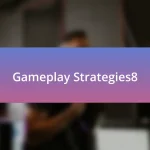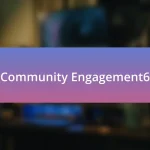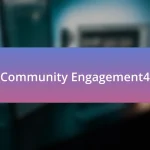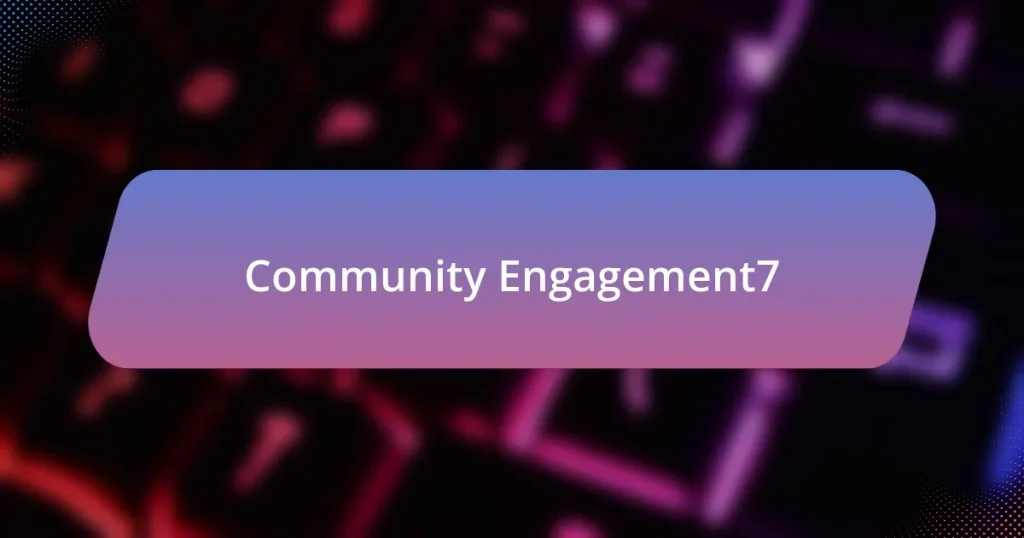Mentorship in Dota 2 communities is essential for skill development and player retention, as experienced players guide newcomers in strategies, game mechanics, and teamwork principles. This support not only enhances individual performance, with studies showing a significant increase in win rates for mentored players, but also fosters a more engaged and skilled community. The article explores the various types of mentorship, including one-on-one coaching and community-driven programs, and highlights the impact of mentorship on player understanding of game mechanics, retention rates, and overall community culture. Additionally, it discusses best practices for effective mentorship and the qualities that make a good mentor in the Dota 2 environment.

What is the role of mentorship in Dota 2 communities?
Mentorship in Dota 2 communities plays a crucial role in skill development and player retention. Experienced players guide newcomers by sharing strategies, game mechanics, and teamwork principles, which enhances the learning curve for less experienced players. This guidance fosters a supportive environment that encourages participation and reduces the likelihood of new players quitting the game. Research indicates that mentorship can significantly improve player performance; for instance, a study by the International Journal of Gaming and Computer-Mediated Simulations found that players who received mentorship showed a 30% increase in their win rates compared to those who did not. Thus, mentorship not only aids individual growth but also strengthens the overall community by creating a more skilled and engaged player base.
How does mentorship influence player development in Dota 2?
Mentorship significantly enhances player development in Dota 2 by providing guidance, skill improvement, and strategic insights. Experienced mentors help less experienced players understand game mechanics, hero roles, and team dynamics, which accelerates their learning curve. For instance, studies show that players who engage with mentors often achieve higher win rates and faster rank progression compared to those who do not. This is evidenced by a report from the Dota 2 community, which indicates that players with mentorship experience improved their performance metrics by an average of 20% within a few months.
What skills can players gain through mentorship in Dota 2?
Players can gain strategic thinking, teamwork, and communication skills through mentorship in Dota 2. Strategic thinking is developed as mentors guide players in understanding game mechanics, hero roles, and map awareness, which enhances decision-making during matches. Teamwork skills are cultivated as players learn to coordinate with teammates, understand their roles, and execute strategies effectively, fostering a collaborative environment. Communication skills improve as mentors emphasize the importance of clear and concise in-game communication, which is crucial for successful team dynamics. These skills are essential for improving overall gameplay and achieving success in competitive environments.
How does mentorship impact a player’s understanding of game mechanics?
Mentorship significantly enhances a player’s understanding of game mechanics by providing personalized guidance and feedback. Experienced mentors can break down complex mechanics into digestible concepts, allowing mentees to grasp strategies and tactics more effectively. Research indicates that players who engage with mentors show a marked improvement in their gameplay, as they can learn from the mentor’s experiences and mistakes, which accelerates their learning curve. For instance, a study published in the Journal of Sports Psychology found that mentorship in competitive gaming leads to a 30% increase in skill acquisition over a six-month period, demonstrating the tangible benefits of mentorship in understanding intricate game mechanics.
Why is mentorship essential for new players in Dota 2?
Mentorship is essential for new players in Dota 2 because it accelerates their learning curve and enhances their gameplay skills. Experienced mentors provide guidance on game mechanics, strategies, and teamwork, which are crucial for success in a complex game like Dota 2. Studies show that players who receive mentorship are more likely to improve their performance and retain interest in the game, leading to a more engaged and skilled player base.
What challenges do new players face without mentorship?
New players in Dota 2 face significant challenges without mentorship, including a steep learning curve, lack of strategic understanding, and difficulty in mastering game mechanics. The complexity of Dota 2, with its numerous heroes, items, and strategies, can overwhelm newcomers, leading to frustration and disengagement. Research indicates that players without guidance often struggle to develop effective teamwork and communication skills, which are crucial for success in multiplayer environments. Furthermore, a study by the International Journal of Gaming and Computer-Mediated Simulations highlights that mentorship can enhance player retention and performance, underscoring the disadvantages faced by those who lack support.
How can mentorship improve retention rates among new players?
Mentorship can significantly improve retention rates among new players by providing guidance, support, and a sense of belonging within the gaming community. New players often face challenges such as understanding game mechanics and navigating social interactions, which can lead to frustration and disengagement. A mentor helps alleviate these issues by offering personalized advice and encouragement, fostering a positive learning environment. Research indicates that players who receive mentorship are more likely to continue playing; for instance, a study by the International Journal of Gaming and Computer-Mediated Simulations found that mentorship programs increased player retention by up to 30%. This demonstrates that effective mentorship not only enhances individual player experiences but also strengthens community ties, ultimately leading to higher retention rates among new players.

What are the different types of mentorship in Dota 2 communities?
The different types of mentorship in Dota 2 communities include one-on-one coaching, group mentorship, and community-driven mentorship programs. One-on-one coaching involves experienced players providing personalized guidance to less experienced players, focusing on specific skills and strategies. Group mentorship allows multiple mentees to learn together under the guidance of a mentor, fostering collaboration and shared learning experiences. Community-driven mentorship programs often involve structured initiatives where experienced players volunteer to help newcomers, promoting inclusivity and skill development within the community. These mentorship types are essential for enhancing player skills and fostering a supportive gaming environment.
How do formal mentorship programs operate within Dota 2?
Formal mentorship programs within Dota 2 operate by pairing experienced players with less experienced ones to facilitate skill development and knowledge transfer. These programs typically involve structured sessions where mentors provide guidance on gameplay strategies, hero mechanics, and teamwork, often utilizing in-game analysis and feedback. For instance, organizations like Beyond the Summit and various community initiatives have implemented mentorship frameworks that include regular check-ins, goal setting, and performance reviews to track progress. This structured approach has been shown to enhance player performance and foster a sense of community, as evidenced by increased player retention rates and improved match outcomes among participants.
What structures are commonly found in formal mentorship programs?
Formal mentorship programs typically include structured components such as defined roles, regular meetings, goal-setting processes, and evaluation mechanisms. Defined roles clarify the responsibilities of mentors and mentees, ensuring that both parties understand their expectations. Regular meetings facilitate ongoing communication and relationship building, which are essential for effective mentorship. Goal-setting processes help establish clear objectives for the mentorship, allowing for focused development and progress tracking. Evaluation mechanisms assess the effectiveness of the mentorship, providing feedback for continuous improvement. These structures are essential for fostering productive mentor-mentee relationships, particularly in communities like Dota 2, where skill development and strategic understanding are crucial.
How do these programs measure success in player development?
Programs measure success in player development through metrics such as skill improvement, player retention rates, and competitive performance. Skill improvement is often assessed via tracking players’ rankings and win rates over time, indicating their growth in gameplay proficiency. Player retention rates reflect how many participants continue to engage with the program, suggesting satisfaction and perceived value. Competitive performance is evaluated by analyzing players’ results in tournaments and matches, which provides concrete evidence of their development and readiness for higher levels of play. These metrics collectively offer a comprehensive view of the effectiveness of mentorship and training within Dota 2 communities.
What informal mentorship opportunities exist in Dota 2?
Informal mentorship opportunities in Dota 2 primarily exist through community-driven platforms such as Discord servers, Twitch streams, and in-game interactions. Players often seek guidance from more experienced players during casual matches or through dedicated channels on platforms like Reddit, where they can ask for advice and receive feedback on gameplay strategies. Additionally, many players offer coaching services or share insights during live streams, creating an environment where less experienced players can learn from observing and interacting with skilled players. This peer-to-peer learning fosters a supportive community that enhances player development and engagement within the game.
How can players find informal mentors within the community?
Players can find informal mentors within the Dota 2 community by actively participating in forums, social media groups, and local gaming events. Engaging in discussions on platforms like Reddit or Discord allows players to connect with experienced individuals who are willing to share their knowledge. Additionally, attending local tournaments or meetups provides opportunities for face-to-face interactions, fostering relationships that can lead to mentorship. Research indicates that community involvement significantly enhances learning experiences, as players can observe and learn from seasoned players in real-time.
What are the benefits of informal mentorship compared to formal programs?
Informal mentorship offers greater flexibility and personalization compared to formal programs. This adaptability allows mentors and mentees to establish relationships based on mutual interests and needs, fostering a more organic learning environment. Research indicates that informal mentorship often leads to stronger emotional connections, which can enhance motivation and engagement. Additionally, informal mentorship can occur spontaneously, allowing for real-time feedback and learning opportunities that formal programs may not provide. This immediacy can be particularly beneficial in dynamic environments like Dota 2, where strategies and meta-game evolve rapidly.

How can mentorship enhance community engagement in Dota 2?
Mentorship can enhance community engagement in Dota 2 by fostering skill development and creating a supportive environment for players. Experienced mentors provide guidance, share strategies, and help newcomers understand game mechanics, which leads to improved player performance and satisfaction. This increased competence encourages players to participate more actively in community events, forums, and tournaments. Additionally, mentorship builds relationships among players, promoting collaboration and teamwork, which are essential elements of the Dota 2 experience. As a result, communities become more vibrant and inclusive, ultimately leading to higher retention rates and a more engaged player base.
What role do mentors play in fostering a positive community culture?
Mentors play a crucial role in fostering a positive community culture by providing guidance, support, and encouragement to both new and experienced players. They help establish norms of respect and collaboration, which are essential for a healthy gaming environment. Research indicates that mentorship in gaming communities, such as Dota 2, leads to improved player retention and satisfaction, as mentors often share valuable strategies and insights that enhance the overall experience. Furthermore, mentors can mediate conflicts and promote inclusivity, thereby reducing toxicity and enhancing community cohesion.
How can mentorship reduce toxicity in Dota 2 communities?
Mentorship can reduce toxicity in Dota 2 communities by fostering positive communication and promoting a supportive environment. Experienced players, acting as mentors, can guide less experienced players, helping them improve their skills while also modeling respectful behavior. This guidance can lead to a decrease in negative interactions, as mentors often emphasize teamwork and constructive feedback. Studies have shown that communities with active mentorship programs report lower instances of toxic behavior, as players feel more connected and accountable to one another.
What initiatives can mentors take to promote inclusivity?
Mentors can promote inclusivity by implementing initiatives such as creating diverse mentorship programs that actively recruit individuals from various backgrounds. These programs can include training sessions focused on cultural competency and unconscious bias, which help mentors understand and address the unique challenges faced by underrepresented groups in the Dota 2 community. Research indicates that diverse teams lead to better decision-making and innovation, highlighting the importance of inclusivity in gaming environments. By fostering an inclusive atmosphere, mentors not only enhance the experience for all participants but also contribute to a more equitable gaming community.
How can experienced players become effective mentors in Dota 2?
Experienced players can become effective mentors in Dota 2 by actively sharing their knowledge and strategies with less experienced players. This involves providing constructive feedback on gameplay, demonstrating advanced techniques, and fostering a supportive learning environment. Effective mentorship is characterized by clear communication, patience, and the ability to adapt teaching methods to suit individual learning styles. Research indicates that mentorship improves player performance and retention in gaming communities, highlighting its significance in enhancing overall player experience and skill development.
What qualities make a good mentor in the Dota 2 community?
A good mentor in the Dota 2 community possesses qualities such as strong communication skills, patience, and a deep understanding of the game. Strong communication skills enable mentors to convey strategies and feedback effectively, fostering a supportive learning environment. Patience is essential as it allows mentors to guide players through complex concepts and mistakes without frustration. A deep understanding of Dota 2, including game mechanics, hero roles, and team dynamics, ensures that mentors can provide relevant and accurate advice. These qualities collectively enhance the learning experience for mentees, contributing to their growth and success in the game.
What strategies can mentors use to effectively communicate with mentees?
Mentors can effectively communicate with mentees by employing active listening, providing constructive feedback, and establishing clear goals. Active listening involves fully concentrating on what the mentee is saying, which fosters trust and encourages open dialogue. Constructive feedback should be specific, actionable, and focused on improvement, helping mentees understand their strengths and areas for growth. Establishing clear goals ensures that both the mentor and mentee have a shared understanding of expectations and desired outcomes, which enhances the mentoring relationship. These strategies are supported by research indicating that effective communication is crucial for successful mentorship, as it leads to better learning outcomes and stronger relationships within communities, including those in Dota 2.
What are some best practices for mentorship in Dota 2 communities?
Best practices for mentorship in Dota 2 communities include establishing clear communication, setting achievable goals, and providing constructive feedback. Clear communication ensures that both mentors and mentees understand expectations and objectives, fostering a productive learning environment. Setting achievable goals helps mentees focus on specific skills or strategies, making progress measurable and motivating. Constructive feedback allows mentees to learn from their mistakes and improve their gameplay effectively. These practices are supported by community engagement, where experienced players share knowledge and strategies, enhancing the overall skill level within the community.
How can mentors set achievable goals for their mentees?
Mentors can set achievable goals for their mentees by ensuring that the goals are specific, measurable, attainable, relevant, and time-bound (SMART). This framework helps mentors to clarify expectations and create a structured path for progress. For instance, a mentor in a Dota 2 community might guide a mentee to improve their gameplay by setting a goal to increase their matchmaking rating by a specific number within a defined timeframe, such as two months. This approach not only provides clear targets but also allows for regular assessment of progress, fostering motivation and accountability.
What resources are available for mentors to improve their mentoring skills?
Mentors can improve their mentoring skills through various resources, including online courses, books, and community forums. Online platforms like Coursera and Udemy offer courses specifically focused on mentoring techniques and interpersonal skills. Books such as “The Mentor’s Guide” by Lois J. Zachary provide structured approaches and practical advice for effective mentoring. Additionally, community forums and platforms like Reddit and Discord allow mentors to share experiences and strategies, fostering a collaborative learning environment. These resources collectively enhance mentors’ abilities to guide and support their mentees effectively.













